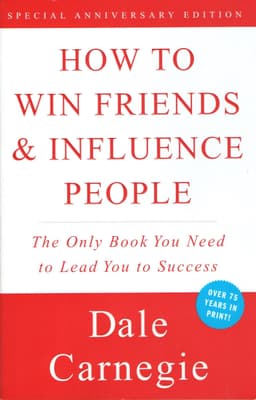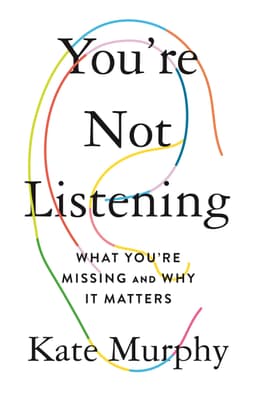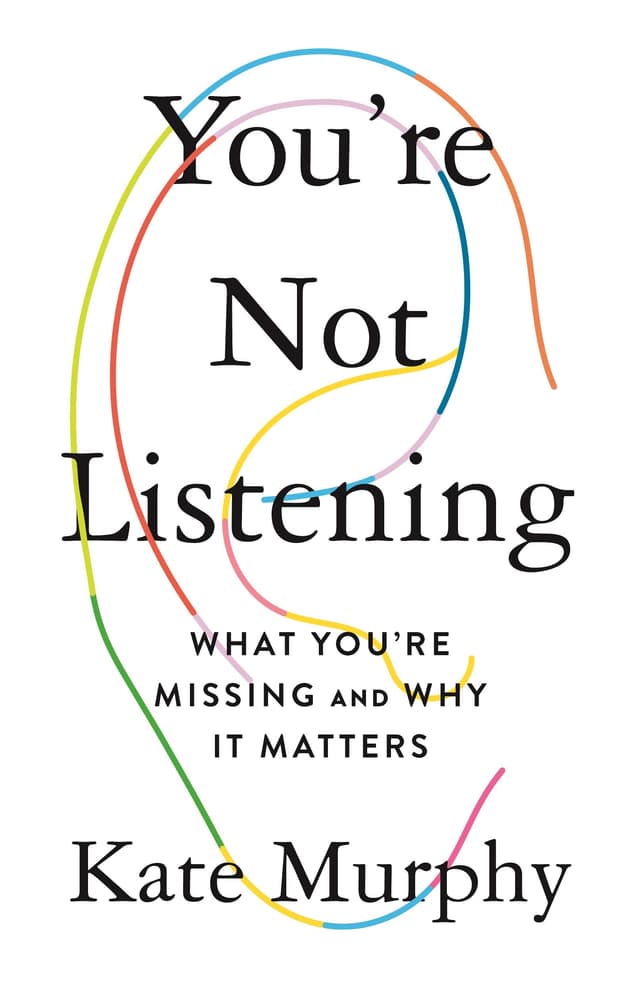
How to Win Friends and Influence People Book Summary
The Only Book You Need to Lead You to Success
Book by Dale Carnegie
Feeling Lazy?Read 1 Minute Summary
Summary
How to Win Friends and Influence People is a timeless guide that teaches you how to handle people, manage relationships, and navigate complex social situations with grace, tact, and sincere appreciation for others, so that you can achieve your maximum potential in both your personal and professional life.
Sign in to rate
Average Rating: 4.83
1. Fundamental Techniques
Don't Criticize, Condemn or Complain
Carnegie argues that criticism is futile because it puts a person on the defensive and usually makes them strive to justify themselves. It is dangerous, because it wounds a person's precious pride, hurts their sense of importance, and arouses resentment. Even if you are right, you only make the other person want to strike back rather than change their mind.
Instead of condemning people, try to understand them. Try to figure out why they do what they do. That's a lot more profitable and intriguing than criticism; and it breeds sympathy, tolerance and kindness.
Section: 1, Chapter: 1
Lincoln's Letter Reprimanding General Meade After The Battle of Gettysburg
After the Union victory at Gettysburg, Lincoln was furious that General Meade did not pursue the decimated Confederate army and potentially end the Civil War. He wrote a scathing letter reprimanding Meade. But once written, he tucked it away and never sent it, realizing that it would relieve his feelings but make Meade try to justify himself and potentially lose his effectiveness as a commander. It was a lesson in the futility of criticism that Lincoln never forgot.
Section: 1, Chapter: 1
The Secret To Influence Is Arousing An Eager Want In The Other Person
The only way to influence other people is to talk about what they want and show them how to get it. Every act you have ever performed since the day you were born was performed because you wanted something.
Dr. Dewey said that the deepest urge in human nature is "the desire to be important." If you tell me how you get your feeling of importance, I'll tell you what you are. That is the most significant thing about you.
Section: 1, Chapter: 2
First, Arouse In The Other Person An Eager Want
"First, Arouse In The Other Person An Eager Want. He Who Can Do This Holds The World With Him"
Remember these key points in influencing others:
- The only way to influence people is to talk in terms of what the other person wants
- The deepest craving in human nature is the desire to be important and appreciated
- If you can arouse an eager want in a person and show them how to satisfy it, you hold the key to influencing their actions
- Before you speak, pause and ask yourself: "How can I make this person want to do it?"
Section: 1, Chapter: 3
If There Is Any One Secret Of Success
To effectively persuade and influence others:
- Don't criticize, condemn, or complain. That only breeds resentment.
- Give honest and sincere appreciation.
- Arouse in the other person an eager want by talking in terms of their wants and needs, not yours.
- Try honestly to see things from the other person's point of view. "If there is any one secret of success, it lies in the ability to get the other person's point of view and see things from that person's angle as well as from your own."
Section: 1, Chapter: 3
2. Six Ways To Make People Like You
Six Ways To Make People Like You
In summary, the six ways to make people like you are:
- Become genuinely interested in other people.
- Smile.
- Remember that a person's name is to that person the sweetest and most important sound in any language.
- Be a good listener. Encourage others to talk about themselves.
- Talk in terms of the other person's interests.
- Make the other person feel important - and do it sincerely
Section: 2, Chapter: 1
Become Genuinely Interested In Other People
The key to making people like you is to show genuine interest in them. Greet people with animation and enthusiasm. Say hello to people you pass. Ask questions that the other person will enjoy answering.
Encourage them to talk about themselves and their accomplishments. Remember that the people you are talking to are a hundred times more interested in themselves and their wants and problems than they are in you and your problems.
Section: 2, Chapter: 1
Who Has The Greatest Difficulties In Life
"It is the individual who is not interested in his fellow men who has the greatest difficulties in life and provides the greatest injury to others. It is from among such individuals that all human failures spring."
Section: 2, Chapter: 1
Smile
Your smile is a messenger of your goodwill. Here are some key points about smiling:
- Smile even when on the phone. It comes through in your voice.
- If you don't feel like smiling, force yourself to smile. Act as if you were already happy, and that will tend to make you happy.
- Your smile is a subtle way of saying "I like you. You make me happy. I am glad to see you."
- Most people smile fewer than 20 times per day. Increase that to over 50.
- Make a conscious effort to put a smile on your face in every interaction.
Section: 2, Chapter: 2
The Sweetest Sound In Any Language Is A Person's Own Name
The name sets the individual apart and makes him or her unique among all others. The information we are imparting or the request we are making takes on a special importance when we approach the situation with the name of the individual.
People love their names so much that they will often donate large amounts of money just to have a building named after themselves. Jim Farley, one of the master politicians of all time, recalled that it was his ability to recall over 50,000 people's first names that transformed him from a small town businessman to a national political figure.
Section: 2, Chapter: 3
Be A Good Listener And Encourage Others To Talk About Themselves
To be interesting, be interested. Ask questions that the other person will enjoy answering. Encourage them to talk about themselves and their accomplishments. Listen intently and give your undivided attention.
Never interrupt. Let the other person do a great deal of the talking. If you want to influence or impress someone, get them talking about something they are passionate about and listen with sincere interest. Carnegie quotes Sigmund Freud who said, "This is the only way to get the best of an argument – avoid it. Agree with them." Don't argue or try to speak. Just listen and they will like you more.
Section: 2, Chapter: 4
Talk In Terms Of The Other Person's Interests
Edward L. Chalif went to see a major prospect to seek funding for sending a Boy Scout to Europe. Instead of just asking for money, he first took an interest in what he knew the prospect enjoyed - rare stamps.
After discussing stamps for a while, the prospect was in a positive mood. Then Chalif brought up the purpose of his visit and the prospect enthusiastically agreed, giving him much more than he originally intended to ask for.
By talking about what interested the prospect first, Chalif got him in a favorable frame of mind to support his cause.
Section: 2, Chapter: 5
Make The Other Person Feel Important - And Do It Sincerely
The desire to feel important is the deepest principle in human nature. "Do unto others as you would have others do unto you." Give others the same courtesy and appreciation you would want to receive.
Talk to people about themselves and recognize their importance. Praise their achievements and give them a reputation to live up to. Compliment people on the things you know they value most in themselves. Make them feel important through your words and actions. But always do it sincerely. Flattery only works if it is genuine.
Section: 2, Chapter: 6
3. How To Win People To Your Way of Thinking
The Only Way To Get The Best Of An Argument Is To Avoid It
Whenever we argue with someone, no matter if we win or lose the argument, we still lose. The other person will either feel humiliated or strengthened in their own position, and will only resent us for making them feel that way.
Even if you manage to shoot holes in their argument, you don't win, you make the other person feel inferior, you rouse resentment and make them determined to justify themselves. Prefer to avoid arguments altogether or use diplomatic language if you do get into one. Look for areas of agreement and allow others to save face.
Section: 3, Chapter: 1
If You're Wrong, Admit It Quickly and Emphatically
Saying "I'm wrong" not only establishes your honesty but often helps solve the problem created by the error. When we defend our position and fight for our stance, it breeds resentment in the other person who feels attacked.
By contrast, admitting our mistakes and taking responsibility for them often causes the other person to respond with sympathy and generosity. Don't defend a mistake; take ownership of it swiftly and earnestly, and the other person will likely minimize it and take your side.
Section: 2, Chapter: 3
How to Criticize—and Not Be Hated for It
When it is necessary to point out someone's mistake, do the following:
- Start with praise and honest appreciation. It is always easier to listen to unpleasant things after we have heard some praise of our good points.
- Call attention to people's mistakes indirectly. Talk about your own mistakes before criticizing the other person.
- Ask questions instead of giving direct orders. This allows the other person to save face and feel that they are reaching the conclusion themselves.
- Praise every improvement, no matter how slight. Be "hearty in your approbation and lavish in your praise." Let the other person know you have faith in them.
Section: 3, Chapter: 2
Let the Other Person Save Face
General Electric was faced with the problem of removing Charles Steinmetz from his position as head of a department due to performance issues.
However, he was a genius at electricity and indispensible to the company so they couldn't afford to offend or lose him. Instead of firing him, they created a new title that sounded important - "Consulting Engineer of General Electric Company" - and gave that to Steinmetz while bringing in someone else as department head.
Steinmetz was pleased rather than insulted because they had let him save face.
Section: 3, Chapter: 5
How To Spur People On To Success
Praise is more effective than criticism in getting people to change and improve:
- Be specific. Instead of saying "You did a good job", say "You did a good job in getting that report out under a tight deadline. I appreciate your extra effort."
- Act as if the trait or achievement you are praising is already one of the person's outstanding characteristics. This gives them a reputation to live up to.
- Refer to a person's good traits or reputation when asking them to make an improvement. "You're always so conscientious, could I ask you to take on this additional task?"
- Phrase your suggestions as questions or requests, not demands.
Section: 3, Chapter: 6
Appeal To The Nobler Motives
People will respond more positively when you make any request or suggestion seem to align with their own nobler motives. J.P. Morgan observed that a person usually has two reasons for doing something - one that sounds good and a real one.
Appeal to the one that sounds good to get them interested. For example, Rockefeller got a stubborn partner to continue a business relationship, not by emphasizing profits, but by praising his work uplifting humanity. Always help the other person feel that your suggested course of action serves the greater good and you will get more enthusiastic cooperation.
Section: 3, Chapter: 10
4. Be a Leader
Begin With Praise And Honest Appreciation
When you need to correct or criticize someone, start by giving them sincere praise and appreciation for their good points. This makes them more receptive to your critique. It's like the old saying "a spoonful of sugar helps the medicine go down". For example:
- "We're really proud of you, Johnnie, for raising your grades this term. However, if you had worked harder on your algebra, the results would have been better."
- "I heard you had trouble with your car yesterday and appreciate you still making it to the sales meeting on time. I did notice that some of your reports were incomplete..." By starting with praise, you get the other person to let their guard down and avoid getting defensive or resentful.
Section: 4, Chapter: 1
How to Criticize - and Not Be Hated for It
A manager at a department store in New York had to deal with a young salesperson who was causing customer complaints due to poor service. Instead of criticizing her directly, he called her into his office and had a conversation:
"Mary, I understand you had trouble with a customer yesterday... [Explains the situation] I'm on your side and I know you were trying your best to handle a difficult customer. However, in future situations like this, it may help to... [Provides suggestions] That way we can ensure the customer leaves satisfied and you have a positive interaction. What do you think?"
By empathizing with Mary and framing his critique as a suggestion rather than a condemnation, the manager was able to correct the behavior without Mary getting defensive. She left feeling supported rather than attacked.
Section: 4, Chapter: 2
Talk About Your Own Mistakes First
It isn't nearly as difficult to listen to a recital of your faults if the person criticizing begins by humbly admitting that he, too, is far from impeccable.
Admitting one's own mistakes - even when one hasn't corrected them - can help convince somebody to change their behavior. For example, one father was trying to get his young son to stop smoking and said: "I know how difficult it is to quit. I started smoking at your age and it took me years to finally quit. hope you can learn from my mistakes and not put yourself through that."
By admitting his own faults, the father made it easier for the son to take his advice.
Section: 4, Chapter: 3
Ask Questions Instead Of Giving Direct Orders
No one likes taking orders. If you want to get someone to do something, make a suggestion or ask a question rather than issuing a demand. For example:
- Not: "Get the report done by 5pm today." But: "Do you think you could have the report done by 5pm today? That would really help us meet our project deadlines."
- Not: "Rewrite this proposal." But: "What do you think of expanding more on the project scope in this proposal?"
By framing demands as questions, you give the other person a feeling of autonomy and control. They feel they are reaching their own conclusions rather than simply following your orders. It preserves their sense of agency and self-respect.
Section: 4, Chapter: 4
Give the Other Person a Fine Reputation to Live Up To
If you want to improve a person in a certain aspect, act as though that particular trait were already one of his or her outstanding characteristics. Shakespeare said "Assume a virtue, if you have it not."
- If a child is shy and withdrawn, comment on how they are really coming out of their shell lately.
- If an employee is struggling with punctuality, comment on how you appreciate how reliable and conscientious they usually are about their schedule.
By "giving them a reputation to live up to", you subconsciously influence them with a strong motivation to prove your high perception of them is correct. Most people will work tirelessly to avoid disappointing you or tarnishing the fine reputation you have ascribed to them.
Section: 4, Chapter: 7
Make People Glad to Do What You Want
People are more likely to do what you want when you frame it so it is aligned with what they want. Here is a summary of how to do this effectively:
- Be sincere. Don't make promises you can't keep or offer incentives you can't provide.
- Know exactly what you want the other person to do.
- Be empathetic. Consider what it is the other person really wants out of the situation.
- Consider what benefits the other person will get from doing what you suggest. How will it advance their goals and desires?
- Match the benefits you offer to the other person's wants.
- When making your request, put it in a form that shows how the other person will personally benefit.
Section: 4, Chapter: 9
Related Content


You're Not Listening
Kate Murphy
In You're Not Listening, Kate Murphy illuminates the profound power of listening to enrich our relationships and unlock our creative potential, while offering penetrating insights and practical tips to help us reclaim this lost art in our distracted, disconnected modern lives.
In You're Not Listening, Kate Murphy illuminates the profound power of listening to enrich our relationships and unlock our creative potential, while offering penetrating insights and practical tips to help us reclaim this lost art in our distracted, disconnected modern lives.
Communication
Relationships
Personal Development

